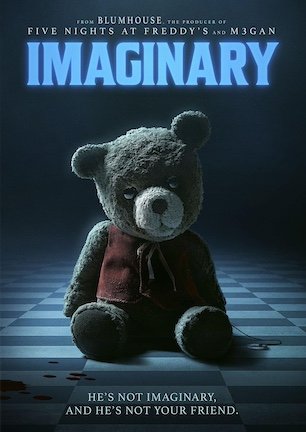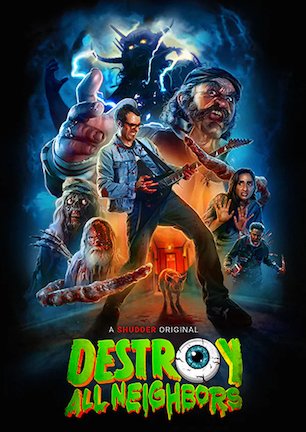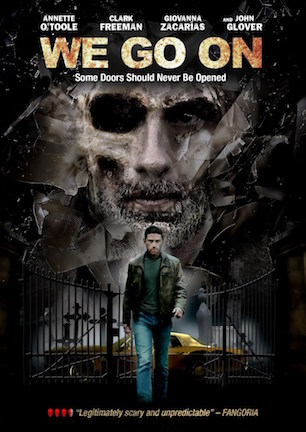Studio: Virgil Films
Director: Roman Chimienti, Tyler Jensen
Writer: Roman Chimienti, Tyler Jensen
Producer: Mark Patton, Roman Chimienti
Stars: Mark Patton, Cecil Edward Baldwin, Robert Englund, Jack Sholder, David Chaskin, Kim Myers, Robert Rusler, Marshall Bell, Clu Gulager, JoAnn Willette
Review Score:
Summary:
Creators and fans of “A Nightmare on Elm Street 2” chronicle the film’s homosexual subtext and its effect on the life and career of lead actor Mark Patton.
Review:
It’s funny to think about how many times I watched “A Nightmare on Elm Street 2: Freddy’s Revenge” as a kid and embarrassingly realize that somehow, its blatant and latent homoeroticism sailed completely over my head. The leather bar, towel whipping, bare butts, and bedroom dance that now bring audiences campy chuckles make the intent obvious in retrospect. At the time though, “Freddy’s Revenge” was just another (underwhelming) fright film. I had no clue I was watching what would come to be called “the gayest horror movie of all time.”
What’s not so funny is the turbulent impact the film ended up having on lead actor Mark Patton. A pretty boy with nowhere to go but up, Patton himself will tell you good looks and better luck had more to do with him breaking into the business than talent did. Fresh off the success of working alongside Cher and Robert Altman, Patton was living a Hollywood dream life while in a romantic relationship with “Dallas” heartthrob Timothy Patrick Murphy. Then Freddy Krueger knocked on his door with an unusual opportunity any upstart young actor would kill for.
What should have been a career booster became a career killer however. Although Patton had not yet come out as gay publicly, “A Nightmare on Elm Street 2” had. With the AIDS epidemic dominating news headlines while carving a death path across the closeted film industry, 1985 was not a friendly time to be associated with homosexuality. Patton’s prospects as a leading man withered to nothing overnight. Feeling unfairly blamed for his film’s newfound notoriety, Patton retreated to Mexico where he remained out of the public eye for 25 years.
With basic background and “I was born…” biography bits out of the way, “Scream, Queen: My Nightmare on Elm Street” truly begins when it starts telling the second half of Mark Patton’s real life tale. Broken professionally and personally, Patton battled back against two debilitating diseases as friends in similar circumstances were far less fortunate. Meanwhile, audiences both ironic and academic found new value in “Freddy’s Revenge” as a tool for teaching about homosexuality in horror.
By the time a P.I. finally tracked down Patton for 2010’s “Never Sleep Again” documentary (review here), there was enough distance from the project for the former actor to see the film from a new perspective. Now “A Nightmare on Elm Street 2” was an opportunity for Patton to reassert himself in his own narrative by connecting with supportive fans, creating a platform for AIDS activism, and coming to terms with the movie that changed his life for the worse before changing it again for the better.
Struggles with homosexual stigmas are an integral part of Mark Patton’s personal ordeal, yet the prevailing theme of overcoming adversity to rediscover one’s identity turns into a story anyone can empathize with. Not particularly dishy about dirty laundry, “Scream, Queen” chronicles only as much of Patton’s fall as necessary for understanding how far back up he would have to climb. In framing Patton as a determined phoenix rising from ashes, the film maintains a sense of earnest hopefulness that becomes genuinely uplifting.
“Scream, Queen” also serves as a stealth primer about the AIDS epidemic and the seismic shockwaves that panic sent behind the scenes of film and TV in the 1980s. Running just north of 90 minutes, the movie doesn’t have the real estate to give such weighty subjects the due they deserve. As a result, “moving right along” mentions concerning important health and historical issues can come across as cursory.
But again, “Scream, Queen” isn’t bent on tabloid tawdriness or unnecessary exploitation. It has a point in mind and commits to meeting that goal. A quick sprint down the HIV time tunnel provides critical context to explain exactly why and how Patton’s career took the turns it did. This wasn’t just old-fashioned bigotry bringing down a gay man. This was a mutant strain of homophobia that had Hollywood on high alert. Patton was one more collateral casualty at a time when closet doors were better left firmly closed.
There’s more material to be mined here than “Scream, Queen” could ever come close to covering as a one-off feature. You can see the film teetering into topics begging for deeper analysis, yet the directors have little choice but to quickly pull back to focus on the main attraction before straying too far. What we do get is a broad portrait of a man humbled by longstanding resentment. Ultimately, Patton finds peace in self-effacing performance parody with drag queens, promoting AIDS awareness, and recognizing the positive power of being a homosexual horror icon. Watching his troubled journey culminate in an optimistic conclusion is an inspiring experience that’s entertaining as well as emotionally encouraging.
Mark Patton makes himself relatable by being openly candid. With neither pomp nor circumstance, “Scream, Queen” simply illustrates the unglamorous side of being B-movie royalty. We see Patton slugging Diet Coke, taking his time getting out of a hotel bed, setting up his meet-and-greet merch stall, and going about the ordinary daily routine of a niche celebrity on the convention circuit. What the camera captures feels fair and honest, translating into a documentary we can view the same way.
“Scream, Queen” encounters less success in creating its villain, which isn’t the Hollywood system that ostracized Patton as a pariah. Rather, “Freddy’s Revenge” screenwriter David Chaskin takes point as the target of Patton’s ire for blaming the actor over “A Nightmare on Elm Street 2’s” gayness only to then take credit when the film later became fashionable. Chaskin isn’t quite Billy Mitchell in “King of Kong.” But the amount of import Patton assigns to Chaskin’s role in his career meltdown seems exaggerated at best. At worst, it feels forced by the film to end on conclusive closure Patton’s story doesn’t necessarily need. “Scream, Queen” is most intriguing when it stays on the message of what Mark Patton made of his situation, not manufacturing an anticlimactic confrontation.
Additional sticking points gumming up the documentary’s gears relate to technical shortcomings. “Scream, Queen” shows the warts of a crowdfunded project. Specifically, tinny audio mars some talking head segments while slipshod camerawork causes eyes to water from excessive blurriness. I’m not sure if venue restrictions possibly required filming on cellphones or if someone set a camera’s lens to autofocus. But grainy imagery badly falling out of focus makes it unfortunate that the crew wasn’t better prepared to cover important moments like Patton’s first reunion in decades with “Freddy’s Revenge” cast members. The same goes for whoever couldn’t keep his/her camera framed properly while recording the cast’s fireside chat afterward.
Forgiving “Scream, Queen: My Nightmare on Elm Street” for the understandable issues of what’s more a labor of love than a PBS-polished documentary, the film remains a thoughtful testament to perseverance as a force for proactive evolution, both of self and society. Hollywood has very few stories where chewed up castaways mold success out of failure. Happy endings are even rarer when AIDS, homophobia, and discrimination are involved. Fortunately, Mark Patton and “Scream, Queen” have one.
Review Score: 75







If you want to see impossible amounts of blood explode crimson colors like the world’s worst version of a gender reveal, well, “Abigail” at least has that.